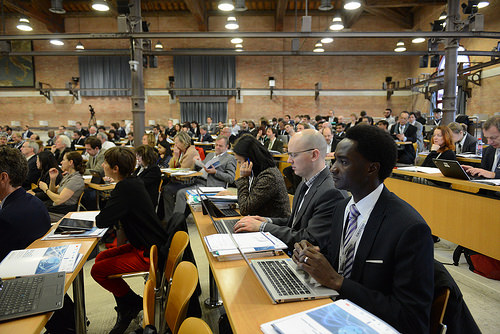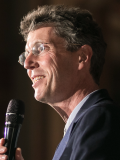In the last week of January 2015, over 200 thinkers from top universities, agencies and governments around the world convened in Venice under the auspices of the Green Growth Knowledge Platform, for the third in a series of international conferences to further knowledge and understanding about the key challenges - and opportunities - that countries face as they attempt to change the direction and quality of their economic growth.
This year's conference - co-sponsored by UNEP, the University of Venice Ca'Foscari, and TERI - focused on how fiscal policies can be applied to shift tax burdens, change behavioral and consumption patterns, and attract or redirect flows of investment to new areas of the economy that can create the conditions for wealth and prosperity, without leaving a rising sea of environmental risks and liabilities that ultimately may jeopardize future growth and well-being.
 The venue was appropriate, as we gathered in beautiful Venice at the charming and well renovated University campus we heard opening remarks delivered by Professor Edward Barbier, among others, who surveyed the knowledge landscape on green growth and green economy over the past thirty years, identifying the new features that now stand for common sense such as internalizing into prices the full costs to society, and remaining lacunas such as the institutional innovations and overcoming inertia of vested interests to fully effect these fiscal reforms.
The venue was appropriate, as we gathered in beautiful Venice at the charming and well renovated University campus we heard opening remarks delivered by Professor Edward Barbier, among others, who surveyed the knowledge landscape on green growth and green economy over the past thirty years, identifying the new features that now stand for common sense such as internalizing into prices the full costs to society, and remaining lacunas such as the institutional innovations and overcoming inertia of vested interests to fully effect these fiscal reforms.
These themes were to echo throughout the discussions of the two day conference, in conversations that varied from detailed technical discussions in parallel sessions to concluding plenaries - closed by the representatives from the IMF, UNEP, GGGI and University of Gothenberg. Generally speaking, we all agreed on the need and utility of fiscal policy reforms to align prices with costs, and to shift tax burdens from those things we want more of (jobs, income) to those things we want to avoid (e.g. water and air pollution).
Going beyond fiscal policy, however, took on a compelling new urgency, as panelists shared their research (and were grilled by policy makers and top economists from leading international agencies), that fiscal policies alone would never be enough.
One panelist in a session I moderated likened implementing price changes through fiscal policy reform to "throwing a bombshell" onto a fragile institutional setting. Another pointed out the rent-seeking and inherently sticky and dysfunctional political economy that emerges around subsidies, be they for fossil fuels or promising green technologies, as people seek to capture windfalls from state beneficence. Clearly, altering relative prices - while a powerful tool and in some cases a strong motivator for consumer and investment decisions - comes with strings attached, and requires at the outset robust and resilient institutions to set the boundaries for market behavior and outcomes.
And clearly, in many cases, these institutions still do not exist or are nascent. Our economies are developing quickly, but the institutions we have created to guide them are not necessarily keeping pace. This point was underlined by Nick Robbins of the UNEP Inquiry, who pointed to an urgent need to revisit the rules and governance of capital markets and how they drive financial flows into or away from the real economy, fundamentally altering the risk-return profiles for investments that advance sustainability.
All this was driven home on the second day of the conference, when - as we were warned the night before - a surge in high tide covered Venice's streets, entered restaurants and hotel lobbies, and blocked the passage for anyone with boots lower than their ankles.
People adapted, of course. Raised walkways were set in the streets; and venders quickly emerged to sell boots and plastic waders. And eventually we all made it to the second day opening plenary, to hear about the innovations needed in financial markets and flanking structural policies needed to make growth greener and really reshape our markets and economies into creators of jobs and value, and not makers of risks and liabilities.
But it was a stark reminder that time is tight, and the status quo is not only untenable but not as firm as it seems. What we have taken for granted for decades, for centuries, could and most probably will change in our lifetime.
Hence the closing remark from Thomas Sterner of the University of Gothenberg, which I very much liked, that this will be the century of fiscal policy reform. This will be the century when institutions and governance must be re-examined and re-aligned with the underlying purpose of our economies - to create jobs, income, wealth, and prosperity.
But the point is, we only have a few decades if not years to reverse the policies that have moved our economies in the wrong direction; or, in the symbolism of Venice, to reverse the tides that are rising all around us. Time to get hopping!

